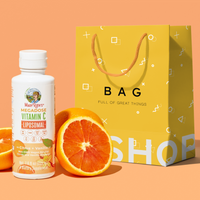
FEATURED
BY COLLECTION
FIND MARYRUTH'S IN STORE!

STORE LOCATOR
Now you can find your all-time faves and discover some exciting new products while you're out shopping.
GET STARTEDVitamin C is an essential vitamin and antioxidant that is known for supporting the immune system. It is a water-soluble vitamin, meaning that it is not stored by the body and must be provided with regular intake.
As an antioxidant, vitamin C limits the damage done by free radicals, and plays a role in the regeneration of other antioxidants, including vitamin E, in the body.
Additionally, Vitamin C is an essential cofactor in the synthesis of collagen, a protein that is vital to the health of multiple parts of the body, including blood vessels, bones, and skin!
How much vitamin C your body needs may depend on many factors, so we always recommend checking with your physician or other healthcare professional for your specific needs.
If you’re curious about what’s recommended by the National Institutes of Health (NIH), below are the Recommended Dietary Allowances (RDAs) as outlined. The RDA is the daily level of intake sufficient to meet the nutrient requirements of nearly all (97%–98%) healthy individuals; often used to plan nutritionally adequate diets for individuals.
|
Age |
Male |
Female |
Pregnancy |
Lactation |
|
0–6 months |
40 mg* |
40 mg* |
||
|
7–12 months |
50 mg* |
50 mg* |
||
|
1–3 years |
15 mg |
15 mg |
||
|
4–8 years |
25 mg |
25 mg |
||
|
9–13 years |
45 mg |
45 mg |
||
|
14–18 years |
75 mg |
65 mg |
||
|
19+ years |
90 mg |
75 mg |
85 mg |
120 mg |
* Adequate Intake (AI)
Our bodies need vitamin C but cannot synthesize this vitamin on their own, which makes it an essential vitamin for everyone. As a water-soluble vitamin, Vitamin C should be provided to the body on a regular basis and can be obtained through the food you eat in your diet, as well as from supplements.
Many foods naturally contain vitamin C, and you can probably meet your daily vitamin C intake through diet alone if you’re eating lots of fruit and veggies! Some food you can incorporate that have vitamin C include red and green pepper, citrus fruits like oranges or grapefruit, broccoli, brussels sprouts, strawberries, and more.
Vitamin C is an essential vitamin, meaning that our bodies can’t synthesize it. This means that we must get vitamin C from our diets or supplements.
Given the many benefits of vitamin C, it isn’t surprising that vitamin C supplements are popular. But if you’ve compared vitamin C supplements, you have probably noticed that there are several different forms of vitamin C supplements out there, and you may wonder which form of vitamin C is best.
Choosing the best nutritional supplement for yourself or someone you care about can come down to multiple factors, including: bioavailability (how much of the nutrient you ingest versus how much of it your body actually absorbs), format (liquid, capsule, gummy, etc.), flavor, amount of the vitamin in the product, and many others. This can again be a great thing to discuss with your healthcare provider!
But for now, let’s go into a little bit more detail on just one of these factors — which form of vitamin C has the best bioavailability?
The form of vitamin C most frequently used in supplements is ascorbic acid, which has a bioavailability that is equivalent to the vitamin C that naturally occurs in foods like orange juice and broccoli. In fact, synthetic ascorbic acid and naturally occurring vitamin C are the exact same compound — they’re both just ascorbic acid; the only difference between the two is where they’re sourced from!
Some studies have shown minor differences in absorption rates between the various types of vitamin C, but the body of research surrounding vitamin C supplementation reflects high absorption no matter which form you choose.
Ascorbic acid occurs naturally in many fruits and vegetables, so you can get your daily vitamin C from foods too. But if you have trouble meeting your daily intake requirements of vitamin C from food alone, ascorbic acid supplements can help you fill that gap.
Did you know? There are actually no bioavailability differences between ascorbic acid in your morning glass of orange juice and ascorbic acid in vitamin C supplements because they are chemically identical!
Because we want you to have the supplement that best fits into your lifestyle and schedule, we have multiple options available for you to supplement with vitamin C!
You can choose from any of our stand-alone vitamin C supplements below, or find others with multiple nutrients (containing vitamin C) as well!
Health education made simple
your shopping bag